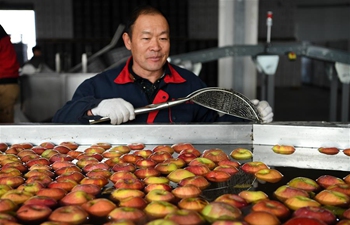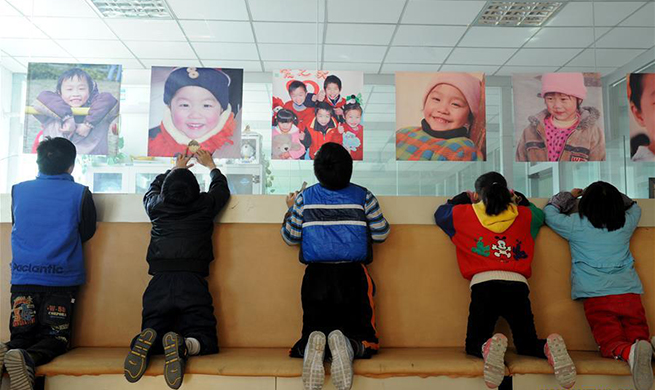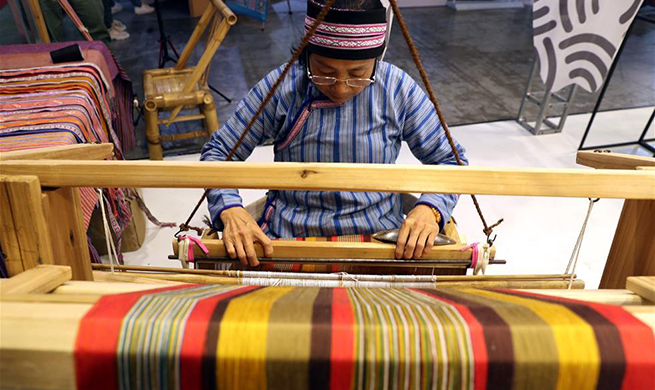CHANGSHA, Nov. 30 (Xinhua) -- The only instruction shepherd Liu Mingxiang received after starting his new job as a part-time performer was "be yourself."
For up to four times every evening, Liu and his son herd goats along the riverbank in Changde, central China's Hunan Province, in one-minute presentations of what he does in the daytime.
Liu's shepherd life used to be penurious, only making 9,000 yuan (1,280 U.S. dollars) a year, but by moonlighting in the live-action show about life in an ancient paradise called "Peach Blossom Garden," the family now receives an extra income of 44,000 yuan.
"Without having to learn how to act, I just needed to be myself -- a shepherd -- and it lifted me out of poverty," said 52-year-old Liu.
"Peach Blossom Garden," or Taohuayuan, is like the Chinese version of Arcadia. Tao Yuanming, an illustrious poet during the Jin Dynasty (265-420), first described the place in prose as a secluded land, where people led idyllic lives far away from wars and turmoils.
Though the story did not mention the location of Taohuayuan, the city of Changde made a claim by establishing a same-name resort, where the 70-minute shows are staged to mimic life in the Chinese dreamland.
To provide audiences with an "authentic idyllic experience," 95 percent of the troupe's 360-member cast are local farmers, said Zhang Jianfeng, general manager of the company that arranges the performance.
There is no actual stage in the show, when villagers gather on the riverbank in the evening with the animals they rear, from goats and horses to cormorants and chickens. As boats carrying the audience pass by, some performers cast nets from fishing boats, and others drive a large gaggle of ducks into the river.
"Actors and actresses only need to be present here during the show, and for the rest of the day, they can return to their farmwork," said Zhang.
Zhang said 10 percent of performers are changed every quarter to benefit more locals. Since its release in 2017, a total of 645 such shows have been staged, which employed more than 1,200 people and lifted 100 households out of poverty.
Gao Liping is a staunch local supporter of the shows. He had been struggling to make ends meet after losing his job at a construction site due to his deteriorating eyesight. The show offered him a tailored role as a bespectacled rural teacher.
"I really hope the shows can go on for as long as possible, as it provides much-needed income for people like me," said Gao, who earns 1,580 yuan every month from the shows.
Some villagers see the performance as more than a source of extra money. Wen Guohua, who wears a bamboo hat and straw sandals in the show as a wrangler and firework lighter, said he once aspired to be a movie star like Bruce Lee or Jackie Chan.
"Though my showtime is only two minutes, I've spent a lot of time thinking how to make my rendition more convincing," said the 51-year-old farmer.
To guarantee the riverside performance is undisturbed by floods or drought, the municipal government is even moving the construction of a new dam 200 meters downstream to ensure suitable water levels.
The case of Taohuayuan is just a small part of China's historic anti-poverty campaign, which lifted 82.39 million rural residents out of poverty from 2013 to 2018, roughly equaling the population of Germany.
With the goal to eradicate absolute poverty by 2020, grassroots wisdom and unique approaches have taken root across the country as the government highlighted targeted poverty alleviation to identify the cause of poverty and suit policies to local conditions.
In the Changde shows, the last thing that requires histrionic training is probably joy. Liu said with the new earnings, coupled with a government subsidy, he built a new 90-square-meter house in August. "This is something I could hardly imagine before working in Taohuayuan," he said.
Changde's tourism industry has also received a boost thanks to the performances. Last year, the resort received over 2.1 million visitors and reaped tourism revenue of over 820 million yuan.
"More city folks are yearning for a return to a more idyllic and natural life, which makes us realize the vast poverty reduction potentials in the rural show business," said Zhang.
"We are expanding the river theater into a larger pastoral one, so we can provide positions for more villagers in the future," he said.

















